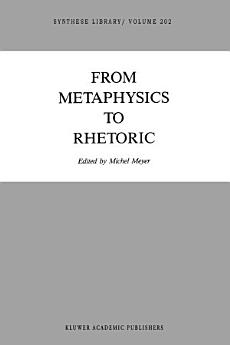From Metaphysics to Rhetoric
Michel Meyer
2012년 12월 · Synthese Library 202권 · Springer Science & Business Media
4.0star
리뷰 2개report
eBook
198
페이지
report검증되지 않은 평점과 리뷰입니다. 자세히 알아보기
eBook 정보
by the question in its being an answer, if only in a circumstantial (i. e. inessential) manner. One indeed must question oneself in order to remember, says Plato, but the dialectic, which would be scientific, must be something else even if it remains a play of question and answer. This contradiction did not escape Aristotle: he split the scientific from the dialectic and logic from argumentation whose respective theories he was led to conceive in order to clearly define their boundaries and specificities. As for Plato, he found in the famous theory of Ideas what he sought in order to justify knowledge as that which is supposed to hold its truth only from itself. What do Ideas mean within the framework of our approach? In what consists the passage from rhetoric to ontology which leads to the denaturation of argumentation? When Socrates asked, for example, "What is virtue?", he thought one could not answer such a question because the answer refers to a single proposition, a single truth, whereas the formulation of the question itself does not indicate this unicity. For any answer, another can be given and thus continuously, if necessary, until eventually one will come across an incompatibility. Now, to a question as to what X, Y, or Z is, one can answer in many ways and nothing in the question itself prohibits multiplicity. Virtue is courage, is justice, and so on.
평점 및 리뷰
4.0
리뷰 2개
이 eBook 평가
의견을 알려주세요.
읽기 정보
스마트폰 및 태블릿
노트북 및 컴퓨터
컴퓨터의 웹브라우저를 사용하여 Google Play에서 구매한 오디오북을 들을 수 있습니다.
eReader 및 기타 기기
Kobo eReader 등의 eBook 리더기에서 읽으려면 파일을 다운로드하여 기기로 전송해야 합니다. 지원되는 eBook 리더기로 파일을 전송하려면 고객센터에서 자세한 안내를 따르세요.










